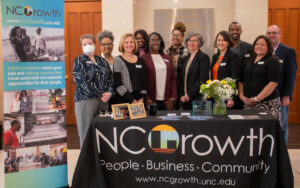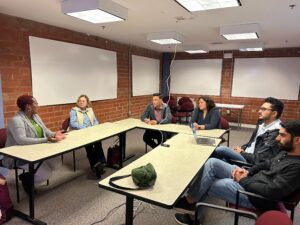News & Stories
Nurturing North Carolina’s future

Abdur Rahman and Hammad Nadeem graduated with their MBAs from UNC Kenan-Flagler Business School in May 2024, landing high-profile jobs at Ernst & Young and Apple, respectively.
But what’s on their minds right now are the people of Robeson County, North Carolina.
Working as analysts for UNC Kenan-Flagler affiliate NCGrowth during their Full-Time MBA Program studies, Rahman and Nadeem are integral to pushing the proposed Liberty Food Processing and Refrigeration co-packing facility closer to reality. They’ve traveled to Robeson County to meet with local farmers, the land owners, members of the Lumbee Tribe, investors, town mayors and a slew of government officials.
They crafted a strategic plan that examined the economic viability of the project, which would create numerous jobs in the economically depressed region, support the culinary heritage of the indigenous Lumbee Tribe and enhance access to locally grown food.
It’s a big project with big goals, but NCGrowth has a big mission: building an economy where all have opportunities to prosper.
“I really absorbed the potential impact of the project when we first visited the Lumbee Tribe,” says Nadeem. “That’s when it really hit me – how this can create a lot of jobs and help local farmers get what they deserve. It’s crucial for Robeson County and the Lumbee Tribe. It could be a first step toward creating an economic domino effect in the area.”
Lasting impact
NCGrowth is guided by a strong set of values, including “leave no one behind.” For more than a decade, it has done just that.
Launched in 2012, the economic development center based at the Kenan Institute of Private Enterprise has touched every corner of North Carolina and every type of North Carolinian.

Through hundreds of projects across North Carolina and neighboring states, NCGrowth is sparking growth in downtowns that haven’t been bustling for a century and encouraged economic development within Black and Indigenous populations. It helped rural Pasquotank and Perquimans counties partner to land a renewable energy development grant. In Wadesboro, it partnered with a community college to convert an abandoned textile mill into a business center that acts as a start-up incubator and entrepreneurship-training space.
It has developed tourism strategies, supported modern agriculture and energy use, worked on social media approaches for small businesses and created hundreds of new, lasting jobs for economically distressed communities with high unemployment rates.
Mark Little, NCGrowth co-founder and executive director, doesn’t call these places “distressed.” Instead, they’re “high-potential.”
“That’s where we can make the greatest difference,” says Little, whose parents are from eastern North Carolina. “We’re always innovating and trying new ways of helping people and communities create more opportunities for themselves. Our team tries to work in ways where failure really isn’t an option. We might not be able to accomplish every goal we have, but we always can have some positive impact.”
Projects come to NCGrowth from different sectors through referrals and personal connections to team members. Community and business leaders reach out with ideas for economic growth and work with NCGrowth to narrow the scope to what’s feasible.
NCGrowth receives funding through multiple sources, including the U.S. Economic Development Administration and other federal and foundation sources. Alumni from UNC Kenan-Flagler and other higher-education institutions also support NCGrowth financially and by volunteering their time as external reviewers, experts in a field related to the project who provide technical advice to the team.
Many projects simply start as an idea from one community member.
“Our mission is generating wealth in places that need it, creating jobs in places that haven’t seen job creation for a long time,” says Elizabeth Basnight (BA ’07), NCGrowth associate director. “The nuts and bolts of what we’re doing is supporting business, but what matters is that we care about the people and the communities that we’re working with. Everybody sees opportunity and strength in these places where we’re working. That is very powerful.”
Students are a huge part of making that difference.
Since its launch, NCGrowth has grown from a staff of four to 12 working across North Carolina and neighboring states — and it’s looking to expand its geographical reach across the U.S., Little says. More than 300 students, predominately those in UNC Kenan-Flagler’s MBA Program, have worked as paid business analysts on projects. They’re paired with program managers who provide guidance and often have connections to communities in need. For their several projects with NCGrowth, Rahman and Nadeem worked with Basnight and senior program manager Christina Theodorou, a Lumbee Tribe member.

Counter-clockwise from the right: Hammad Nadeem (MBA ’24), Abdur Rahman (MBA ’24) and Senior Program Manager Christina Theodorou discuss the Liberty co-packing facility project with stakeholders.
It’s experiential learning that broadens and deepens understanding of business on a hyper-local level.
“The gears change in a different direction when we go to a community and an analyst has a chance to walk the land, talk to the people and see what they’re working toward,” says Nicole Outlaw, who joined NCGrowth as a program manager in 2018 and now is assistant director of engagement. “These students are interning at places like Amazon and Microsoft, but for them to be able to work for a company that has one or two employees and apply what they’ve learned about the marketplace there, it gives them some real-life experience.”
It’s personal
Rahman and Nadeem, who learned about NCGrowth during MBA orientation, brought unique backgrounds to their projects. Rahman has an engineering degree and experience in the oil and gas industry; Nadeem previously worked in operations at Nestlé. Both were looking for the kind of new experiences that NCGrowth offers.
“What attracted me to the role was that it was a consulting experience where you got a chance to work closely with local communities and small businesses and actually make an impact on the livelihood of an area and its citizens,” says Rahman. “I wanted to experience what it’s like working with local businesses, and I also wanted to strongly contribute to the community.”
It’s not just “business for good” but business vital to the region’s future. At any given time, NCGrowth is working on 20-30 projects across North Carolina and South Carolina with assistance from 30-40 students. The experience has shaped career paths; several student analysts have decided to work in economic development after graduation.
“Our student analysts are changing lives,” says Basnight. “It changes their lives, too.”
Like Basnight, whose family has lived in eastern North Carolina for centuries, the work is deeply personal for Outlaw. She was born and raised in Bertie County, North Carolina, an area where NCGrowth frequently works and where the median household income is about $42,000 compared to North Carolina’s median household income of $68,000. She is based out of her home in Windsor when she’s not on the road to meet with or check in on clients.
Outlaw, who before joining NCGrowth was a client, has long heard people refer to rural towns in North Carolina like Windsor as dying communities. Those working at NCGrowth do not see dying communities. They see communities that can thrive.
“I have a 12-year-old daughter who goes to middle school here in Windsor,” says Outlaw. “And if we want her to come back to this region to work, we really have to set up better systems and jobs that will make people stay or come back. The types of projects we work on impact everything from our food insecurity to our overall well-being. Especially in rural and distressed communities, NCGrowth has the opportunity to help change the world.”